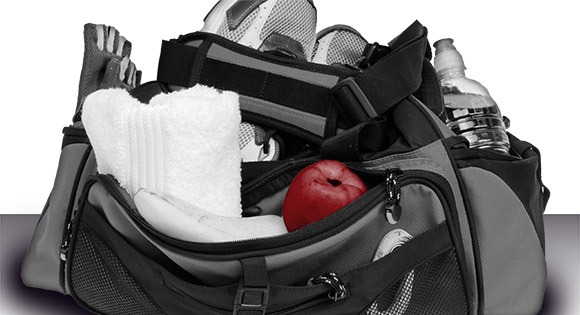Improving your performance through nutrition
Katie Desin, MS, RD, CSCS
There are many ways that athletes can improve their performance: hard work at practice, extra hours in the gym, and time in the weight room. What about how they’re fueling their bodies for all of these activities? This can have a tremendous impact on how well a young athlete is able to perform. The better quality of food a person puts in his or her body, the more he or she can get out of it. There are three other important factors when it comes to nutrition for exercise: the type of nutrients eaten, the amount eaten, and the timing of intake.
The primary source of fuel that an athlete uses during exercise comes from carbohydrates. Carbohydrates are broken down into glucose molecules in our bodies, and delivered to our muscles to be stored in the form of glycogen. These glycogen stores provide much of the energy that athletes use for higher-intensity workouts. For optimal performance, it is important to get in plenty of carbohydrates from healthy sources such as whole grains, fruits, vegetables, and low-fat milk and yogurt.
It is important that athletes are fueling their bodies with an adequate amount of carbohydrates and protein; and that these nutrients primarily come from healthy sources.
Protein plays an important role as well, especially when it comes to strength and recovery. Protein is made up of amino acids, which are the building blocks for our muscles and other tissues in our bodies. Athletes need greater amounts of protein in their diets, as they are breaking down muscle tissues during workouts and trying to improve muscular strength. Depending on an athlete’s activity level, he or she will need to eat 0.5-1 gram of protein per pound of body weight each day. Healthy sources of protein include legumes, nuts, seeds, eggs, low-fat milk, yogurt and cheese, poultry, and lean cuts of meat.
Timing of meals and snacks plays an important role before and after workouts. Pre-workout, athletes should have larger meals 3-4 hours prior to exercise, with smaller snacks 1-2 hours prior to exercise. After a workout, it is best to eat as soon as possible. The optimal pre- or post-exercise meal or snack is high in carbohydrates, has a moderate amount of protein, and is low in fat.
Before exercise, carbohydrates eaten help to ‘top off’ glycogen stores so that athletes have plenty of energy available. Protein before exercise helps their muscles to recover faster. Eating 1-2 hours prior to exercise allows time for digestion and provides more energy for an athlete’s workout. Eating a high-fat meal before a workout is not recommended, as fat takes a long time to digest and can cause stomach upset if too much is eaten before exercise.
When and what an athlete eats after a workout can influence recovery and energy available for his or her next practice or competition. Athletes should eat as soon as possible post-exercise. After a workout, glucose delivery to skeletal muscle is enhanced, allowing for greater muscle glycogen stores. However, this effect is short-lived, lasting between 30 minutes and 2 hours. It is best to combine carbohydrates and protein post-exercise with a ratio of 3:1 or 4:1, carbs:protein. By combining carbohydrates and protein, the athlete’s muscles are able to take in even higher amounts of these two nutrients than if they were eaten separately.
Overall, it’s important that athletes are fueling their bodies with an adequate amount of carbohydrates and protein; and that these nutrients primarily come from healthy sources. Reducing or eliminating high-fat, processed foods will help athletes feel better and give them more energy for workouts and competition.

Pre-Exercise or Post-Exercise Snack Ideas*
- Chocolate Milk
- Peanut Butter and Jelly Sandwich
- Cereal with Milk
- Cottage Cheese and Fruit
- Graham Crackers and Peanut Butter
- Yogurt with Granola
- Veggies and Hummus
- Granola Bar
- Turkey Sandwich
- Carnation Instant Breakfast
- Bagel with Almond Butter
- String Cheese and Whole Grain Crackers
- Pasta with Meat Sauce
*High in carbohydrates, have a moderate amount of protein, and are low in fat.







